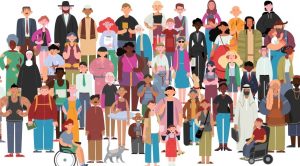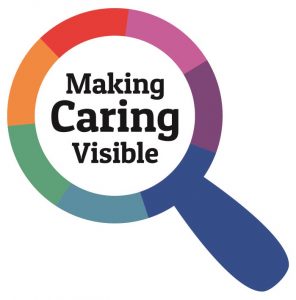Dear friends,
Those who know me well are aware that I’m much better with words than with numbers. Large figures usually don’t mean much to me but a headline last week estimating that 4.5 million people in the UK have become unpaid carers as a result of the Covid-19 pandemic did catch my eye. And the comment that this is equivalent to the NHS workforce three times over made me stop and think.
According to the Scottish Government’s Carers’ Charter, a carer is defined as someone of any age who provides unpaid support to family or friends who could not manage without this help. This could be due to illness, disability, frailty, a mental health problem or an addiction. Some are life-long carers, while others may care for shorter periods of time. Carers can be any age, from young children to very elderly people.

When I was growing up, the term ‘Young Carer’ wasn’t in use, but between the age of fourteen and twenty one, I was very involved in helping my mother to care for my grandmother who was living with us. She came for a holiday one summer, had a stroke which caused her to lose her sight and gradually became increasingly frail and confused. In her last years she was bed-ridden and needed twenty-four hour care. During that time I used to come home from university most weekends to give my mother respite. The pressure on us as a family was immense because there was very little formal support for carers in those days— you just had to get on with it. It took my mother a number of years to recover from the physical demands of heavy nursing, the prolonged lack of sleep and the stress and worry of it all.
Things have improved for carers since then and so they should have. Unpaid carers are the pillars of our health and social care systems. It is estimated that they are saving the Scottish economy over 10 billion pounds a year. Yet, many of them say they feel invisible and ignored. A recent survey by Carers UK has shown that a half the care-givers in Scotland are struggling to make ends meet, that a third had not had a break in more than a year and that about three-quarters reported a deterioration in their own health, both mental and physical.
 Why am I telling you all this? This week is Carers’ Week and we all have a role to play. If we ourselves are not giving or receiving care right now, then, as individuals and as a church community, we can recognize and support the carers in our midst through prayer and action. We can also add our voices to the call to ‘Make Caring Visible in 2020’. If you have access to the internet you can do this by visiting www.carersweek.org and encourage others to do the same. I have taken the liberty of pledging on behalf of St Mary’s that we will do all we can to recognise and support unpaid carers of all ages in our congregation and in our community.
Why am I telling you all this? This week is Carers’ Week and we all have a role to play. If we ourselves are not giving or receiving care right now, then, as individuals and as a church community, we can recognize and support the carers in our midst through prayer and action. We can also add our voices to the call to ‘Make Caring Visible in 2020’. If you have access to the internet you can do this by visiting www.carersweek.org and encourage others to do the same. I have taken the liberty of pledging on behalf of St Mary’s that we will do all we can to recognise and support unpaid carers of all ages in our congregation and in our community.
I asked my mother what would have helped her all those years ago. ‘The important thing is to keep in touch’, she said. ‘A card with encouraging words, kind thoughts, assurance of prayers would have given me strength on bad days. Someone popping in now and then or an invitation for a cuppa would have given me a break, a change of mind, a chance to talk and put things in perspective. Some way of making sure that I could get to church services or events would have kept me connected and given me space to turn to God. It is all very simple,’ she said, ‘but it would have made a huge difference’.
With love,
Nerys






